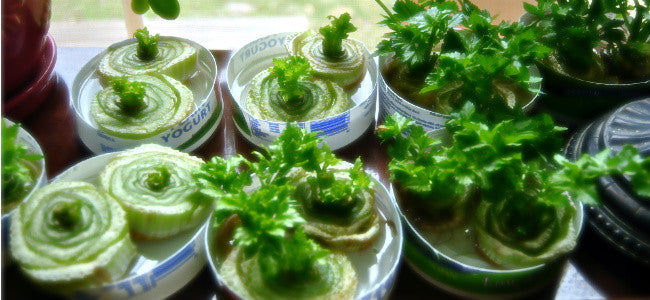14 Tips to Reduce Kitchen Waste

We all have aspirations to reduce our waste, though often the practicalities of modern life can get in the way. In this post, we’re going to share with you some simple tactics and suggestions to help you make it work, starting with the kitchen. Why the kitchen? Because this is one of the places where a great portion of the wastes in our lives are generated. And remember, the goal is to just start and do it, it’s not to be perfect. None of us are perfect, but if each person just makes some minor changes, then collectively we can make a huge impact.
1. Regrow your vegetables

Not only is this a great way to reduce your waste, it can be a fun and engaging activity for the family. Your kids are going to love it. Obviously, this won’t work for all vegetables, but ones like spring onions and potatoes can be regrown in nothing more than a dish of water. Heck, potatoes will often sprout even without water. Make sure to put your old vegetables near a windowsill so they can get some sunshine, sit back, and watch the magic happen.
2. Don’t get sour over expired milk

Milk has a relatively short shelf life and more often than not, we over buy and can’t finish before it goes bad. But hold on a second. Rather than pouring the expired milk down the sink, you can actually use it to make delicious cottage cheese. There are plenty of recipes on Google, just give it a go.
3. Say “No” to disposables

We can all love and appreciate a clean kitchen, but you do not need to use disposable (and wasteful) items such as plastic trash bags, paper towels, and cling wrap. These items can be replaced with cloths and rags, which can be reused. Glass or ceramic containers with lids will make plastic cling wrap obsolete. If you’re adventurous, get rid of the plastic trash bag all together and just use the bin. It only requires a tiny bit of extra effort.
4. Coffee grounds are your friends

After you brew that delicious cup of morning coffee, don’t be so quick to throw out the coffee grounds. You can use it as a nutritious fertilizer for your plants – just dump the coffee grounds into your flower pot. It can also be used as an insect deterrent, as ants especially hate touching coffee grounds.
5. Get rid of the plastic

Yes, yes, we all know this one. It’s an obvious one, but many of us are still guilty of using plastic bags when we shop. In this day and age, there is just no excuse. If you haven’t already, invest in some reusable shopping bags. Put them everywhere, in your kitchen, in your car, so you’ll always have them when you go shopping.
6. Bake old fruit into desserts

You might not like to eat fruits that are a little past their best, but these ripened fruits are great for many dessert recipes. You can try making breads, crumbles, sauces, and jams with your left over fruits, which one, is healthier than store-bought options, and two, prevents waste.
7. Drink from the tap

Plastic water bottles are a terribly wasteful way to drink. Invest in a water filter and drink your tap water. You could even get a reusable sports water bottle and carry it with you. Not only is this far better for the environment, but you will be saving yourself money too!
8. Plan ahead

Before you head to the grocery store, think about what you really need. If you sit down and look through what you already have in your fridge and cupboards, as well as plan your meals and only buy strictly what is on your list, you are far less likely to have waste at the end of the week.
9. Buy in bulk

Buying in bulk reduces the amount of packaging used and wasted. While you won’t be able to do this for every single type of item, foods such as pasta, flour, and rice can be easily purchased in bulk. Just make sure to store the leftovers in a cool and dry place in your home.
10. Revive your snacks

Stale snacks can be revived with a ten second blast in the microwave – your party guests need never know!
11. Start composting

Sometimes you can’t avoid throwing food away. The good news is that most of it can be turned straight into compost! There are many different ways to compost and it can be an interesting and rewarding pastime that will make your garden glow.
12. Freeze your flat drinks

If your fizzy drinks have lost their va va voom, don’t pour them down the sink. Why not pour them into ice trays instead? Simply stick them in the freezer and you can be sure they will be a treat in warmer weather!
13. Cook from scratch

Many foods you consume on a regular basis can be easily made from scratch at home. It takes a little bit of effort to get used to the process at the beginning, but once you have got the hang of things, making them will be second nature to you. Yogurt, bread, cereal, and even canned fruit and vegetable can all be homemade. Not only will you reduce your packaging consumption, but the end result will likely taste better than store-bought options.
14. Choose packaging wisely

Sometimes packaging in the supermarket is unavoidable. In situations like this try, where possible, to go for recyclable materials such as card and paper, metal or glass. Avoid plastic, as it cannot be completely recycled.
What’s Next?
So there you have it – 14 handy tips to start reducing waste in the kitchen. Even trying out a few can have a big impact on your life, as well as the environment.
Do you have friends who need to know these tips? Share it with them by clicking the social buttons below!Sources:
http://www.treehugger.com/green-home/5-steps-toward-going-zero-waste-kitchen.html
http://derryair.eu/zero-waste-resources/ten-steps-to-zero-waste/
http://www.rd.com/slideshows/13-steps-to-a-zero-waste-kitchen/#slideshow=slide1






